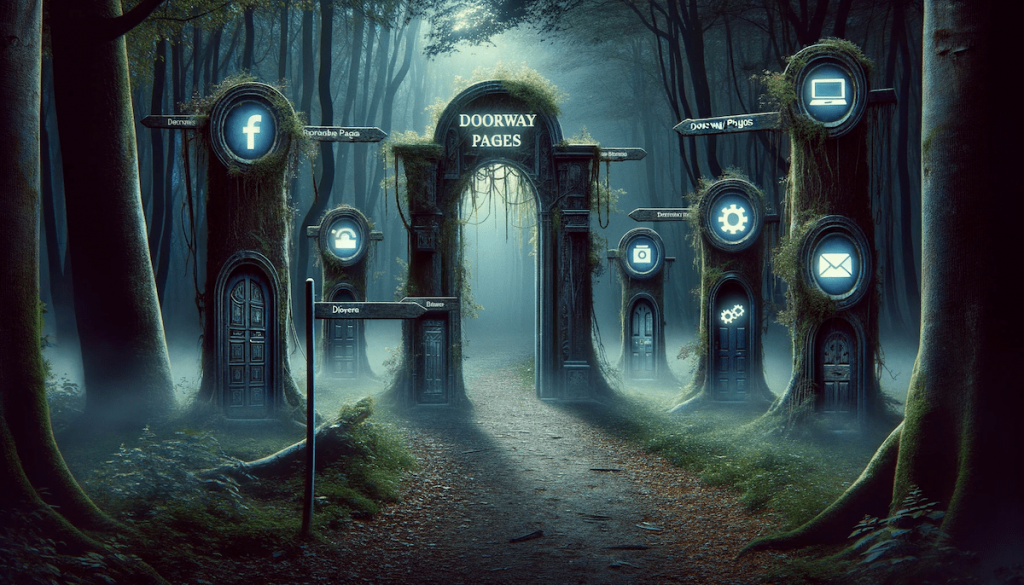
A Gonzo Guide to Blackhat SEO
This spooky season, we thought it would be fun to have our blog dress up for Halloween, and share some expert SEO and Content Marketing advice while cosplaying as different characters – both fictional and real. And since we write so much content here at Socialed, it’s only natural that some of those characters would be some of our favourite writers. So in this 3rd installment of our Halloween parody series, we imagine what the great American gonzo journalist Hunter S Thompson might write as a SEO Expert.
In the mad world of the digital highway, the game of Search Engine Optimization (SEO) is the psychedelic ticket to the big circus of site traffic. But, as any twisted road trip through the desert of the internet will show, there’s a dark underbelly, a realm of shadowy tricksters and unhinged tactics – they call it the blackhat SEO.
Dive into this dark and dubious rabbit hole and the search engine gods might just smack you down, exiling you to the wastelands of the web. It’s a treacherous game, and you’ve got to know the rules if you want to play. In this fever dream of a guide, we’ll dissect the unhinged world of blackhat SEO, show you its ugly face, and teach you how to steer clear of its siren call. So, strap in and hold on, it’s going to be one hell of a ride!
So What is Blackhat SEO?
In the wild frontier of the digital realm, there’s a dark and twisted path known as blackhat SEO. It’s the unholy grail of shortcuts, the siren call to those seeking a quick climb to the top of the search engine mountain. So beware, for this is a path is riddled with treachery and folly.
After all, search engine deities have their own commandments, their Webmaster Guidelines, which are not just suggestions but sacred scripts. Stray from this path, and you risk invoking their wrath, a catastrophic curse that could banish you to the abyss of irrelevance.

It’s no secret that the all-seeing eyes of search engines, with their ever-evolving algorithms, are on a relentless quest to serve the true desires of their disciples, the users. Face the wrath of Google, and you’ll find your digital empire crumbling, cast down from the peaks of visibility or, worse, banished from the realm entirely. And it’s a treacherous climb back to the promised land.
Top 10 Most Common Blackhat SEO Tactics
The siren song of bad SEO might beckon, but it’s a one-way ticket to obscurity. So, before we get too lost in the desert, let’s dive deep into the dark alleys of blackhat SEO, shining a light on these rogue tactics and charting a course to steer clear of them. Strap in, it’s about to get wild!
Keyword Stuffing
In our last psychedelic detour through the SEO landscape, we grazed upon the notorious beast known as keyword stuffing. Imagine a wild party where the same song just keeps playing on repeat – that’s what keyword stuffing is to a webpage. Sure, a tune here and there helps the search engine gods groove to your content’s rhythm, but overdo it and they’ll toss you out of the club. Here’s a glimpse into this reckless dance: Picture an article, but every other word is the same, echoing like a bad trip. It’s jarring, isn’t it? And downright spammy. The digital overlords – those search engine sentinels – have a sixth sense for sniffing out such tomfoolery. Cross them and they’ll exile you to the back pages of search results.

So, what’s the plan, you ask? Ride the wave but don’t drown in it. Use those keywords, but like a fine whiskey, in moderation. Tools like Yoast SEO or Rank Math can be your guiding star. Think of them as the trusty sidekicks on this wild journey: Example of sage advice from Yoast SEO. Not only do they whisper the secrets of the digital realm, but they’ll also slap you on the wrist if you start tripping over your own SEO ambitions. They’ll tell you if you’re laying it on too thick or if you’re humming a tune that’s already been sung elsewhere on your site. Keep it real, keep it natural, and always listen to the rhythms of the digital cosmos.
Hiding Content
In the deranged carnival of the digital realm, some folks, driven by sheer madness or desperation, resort to conjuring tricks reminiscent of a seedy magic show. One of the oldest tricks in their bag? The art of invisibility. By this, I mean hiding content on their web pages – a dastardly deed of camouflaging text and links to match the background, rendering it invisible to the human eye but loud and clear to the search engine’s ears.
Here’s how some of these digital illusionists perform their acts:
- Burying the content behind some flashy image.
- Shrinking the font to a size so minuscule it might as well be written for ants.
- Adding a sly class name to a page element and setting its status to “gone” in the cosmic CSS playbook.
Why the shenanigans? To cram their site with a truckload of keywords, hoping to skyrocket their place in the ranks, all while keeping the mess hidden from unsuspecting visitors. But here’s the kicker: the all-seeing eyes of search engine algorithms ain’t easily hoodwinked. They’ll sniff out these tricks like a shark senses blood. And when they do, your website might be cast into the digital abyss for these cloak and dagger tactics, drowning in penalties. Even if by some miracle, the hidden gibberish is somewhat related to your content, you’re still in hot water for trying to game the system. So, in the immortal words of the good Doctor himself: “Buy the ticket, take the ride.” But remember, sometimes the ride plunges straight into chaos. Don’t be that guy.
Cloaking
In the digital wilds, there exists a dark art known as ‘cloaking.’ Not the sort that’d make you invisible in a bar brawl, but a trickery of the highest order on the vast interwebs. Picture this: it’s like showing a thirsty man a vision of an oasis, but when he gets there, he’s greeted by a swarm of locusts. In the realm of SEO, it’s the old switcheroo – showing one thing to the robotic eyes of search engines and another, often sinister, thing to us mere mortals.
Imagine a page, brimming with poetic HTML texts for the search engine spiders, while we humans get a psychedelic show of images. Or perhaps, those savvy with the magic of JavaScript see a different realm than those without. It’s a treacherous game, this cloaking business. You think you’re diving into a pool of knowledge, only to find yourself drowning in a cesspool of ads, malware, and digital trickery.
The mighty overlords, like Google, try to shield us. They raise flags, warning us of the digital dungeons that might plunder our data or unleash chaos on our devices. But cloaking? It’s a master of disguise, sneaking past these guards. However, fret not! Google, in its infinite wisdom, has scribbled down sacred scrolls – guidelines, if you will – to help you tread this path without falling into the cloak-and-dagger traps. Stick to the straight and narrow, and the digital gods will look favorably upon you.
Article Spinning
In this psychedelic digital age, there’s a dark alley of the web called article spinning. It’s akin to the acid trips of plagiarism, where folks lift tales from other realms, give them a little twist, and pass them off as their own fever dreams. Some even beckon the sorcery of AI, letting machines spit out rehashed stories for their digital campfires. But beware, for the all-seeing eye of Google can sniff out these doppelgangers, and it ain’t too fond of them. It’ll slap you with penalties faster than a bat out of hell.
And then there’s the age-old code of the road – respect. Pilfering someone’s musings is not just bad mojo; it’s theft, plain and simple. And some won’t just curse you from afar; they’ll summon the law and drag you into the legal trenches.
Now, I get it. In this vast expanse of information, it feels like every tale has been told, every secret whispered. Whether you’re singing praises of the latest SEO sorcery or penning odes to the City of Lights, you’re treading paths many have walked before. But here’s the deal: blaze your own trail. Let your voice echo through the canyons of the web. Take old tales from your archives, breathe new life into them, throw in your snapshots, and let them soar to new heights on the SERPs. Always remember, it’s better to be a genuine outcast than a second-rate copycat.

Misuse of Schema Markup
In the neon-lit maze of the digital highway, there’s a nifty tool called Schema markup. Think of it as a psychedelic decoder ring, allowing the search engine giants to trip through your content, understanding its essence. Add this magic to your digital canvas, and suddenly your pages in the SERPs start to shimmer and glow. These aren’t your run-of-the-mill search results; they’re jazzed up with tidbits like star ratings or the price of that rare artifact you’re selling. And guess what? These glitzy snippets are like flame to moths; they pull in curious wanderers, sending your CTRs sky-high.
If you’re riding the WordPress wave, sprinkling this Schema magic is a breeze with the right plugin. But here’s the kicker: don’t get greedy. Overstuffing your markup with keywords is a quick ticket to a digital hangover. And watch out for those shifty tricksters, adding fake tales and reviews, trying to dazzle with false glitter. That’s a dangerous game, and it can send your rankings plummeting into the abyss. So, as you embark on this journey, let Google’s rich snippet gospel be your guide. Stay true, and the digital cosmos will reward you.
Doorway Pages
In the twisted highways of the digital universe, there exists a shadowy alley known as ‘Doorways.’ Imagine this: a maze of mirror-like sites or pages, all crafted with the sinister intent of luring the unsuspecting into the same dark corner. It’s like a roadside motel with multiple neon signs, all pointing to the same dingy room.
Picture an eager traveler, scouring the map for a specific locale, only to find multiple markers. No matter which he selects, they all lead him to the same unexpected and often irrelevant destination. It’s a crafty game, where a webmaster might conjure up a myriad of pages, each singing a different regional tune, yet all play the same somber note at the end. Some might even use magical plugins to weave these doorway pages with swift precision.
Now, don’t mistake this dark art for the notorious ‘cloaking.’ While both are treacherous, doorways are a unique beast. They don’t disguise content; they harness the power of legitimate SEO tactics to drag the innocent into uncharted territories. The digital overlords, like Google, frown upon such deceit. There’s no righteous path that employs doorway pages. So, for those sailing the vast sea of the internet, it’s best to steer clear of these treacherous waters.
Buying Backlinks
In the vast, neon-lit digital jungle, search engines, those omnipotent beasts, have a peculiar fascination with backlinks. Imagine them as trails of breadcrumbs leading to your digital den. The more trails from various corners of this digital wilderness, the more Google sees you as the kingpin, the go-to joint. And that, my friends, can rocket you to the top of their infamous charts, the SERPs.
But here’s where the plot thickens. Some sly operators, seeing the allure of these backlinks, started peddling them like cheap narcotics. Pay them, and they’d shoot a link your way. But pump too many of these synthetic links into the bloodstream of the web, and search engines might tag you as a dealer or a spam junky to be avoided. Plus, dabbling in this black market of links is a violation of Google’s sacred commandments, their Webmaster Guidelines. Get caught, and they’ll drag you into the digital alley and deliver a swift penalty.
But fear not, for there’s light in this murky tunnel. There are righteous paths to gather these precious backlinks. You can spin tales for other digital realms, guest posting and weaving in a subtle nod to your own space. Or join forces with fellow digital wanderers, collaborating on epics and swapping tales. Find a fallen link on a site? Be the good Samaritan, point it out, and subtly suggest your own as the worthy successor. The digital cosmos is vast, and the opportunities endless. Just remember to play it straight, and always ride with the wind.
Blog Comment Spam
In the wild digital badlands, if you’re a keeper of a blog, you’ve probably faced the pestilence known as comment spam. It’s like those pesky hitchhikers on the side of a desert highway, holding up cardboard signs with links to their own territories. The game? Score free rides (or backlinks) from unsuspecting travelers: a classic move from the blackhat SEO bandits.
Now, while this may sound like a cunning tactic, you’re more likely to get tossed out of the saloon than win the jackpot. Drop a comment just to flash your link badge, and you might find yourself outlawed from that territory. The trick? Don’t be that desperado. If you’ve got something to say, make it count. Share a piece of wisdom, a story, or a handy tip, and then, if it fits, point folks to a treasure trove you’ve got stashed elsewhere. Some digital taverns, wise to these antics, have their comments labeled ‘nofollow’ – a signpost telling search engines to turn a blind eye, discouraging link hustlers.
And if your own digital saloon is getting crowded with these spam slingers, it tarnishes your rep in this online wild west. Put a sheriff in place, like a comment moderation system, to keep the riffraff at bay. If you’re riding the WordPress stallion, a trusty sidekick like Akismet might be just the partner you need. Stay sharp, stay genuine, and remember, in the realm of SEO, it’s a wild ride.
Sponsored Pages and Posts
In the psychedelic circus of the internet, if you’re a scribe, a bard, or a digital storyteller, you might find yourself courted by the brand wizards and website warlocks. They’ll flash their trinkets, wave their wads of cash, all for a piece of your digital real estate – a link, or maybe even a whole damn article pointing back to their digital lair. But here’s the rub: the mighty Google deems these link escapades as the devil’s play.
So, how do you dance with the devil without getting burned? Make it loud and clear: it’s a sponsored gig. Use those ‘nofollow’ or ‘sponsored’ charms: Tagging the link with nofollow and sponsored in the Gutenberg realm. These magical incantations tell the ever-watchful eyes of search engines to turn a blind eye, to skip past these links when they’re taking their nightly stroll through your site. The readers? They still get their dose of sponsored wisdom. The brand? They revel in the glow of your audience’s gaze. But you, my friend, sidestep the wrath of Google and its kin. You see, this ain’t just about peddling a link; it’s about selling a ticket to the show that is your audience. And while the show must go on, remember to always play by the rules of the digital jungle.
Webrings or Private Blog Networks
In the wild, untamed frontiers of the digital cosmos, there once roamed creatures known as Webrings, or the notorious Private Blog Networks (PBNs). Imagine a band of renegade sites, conspiring in the shadows, whispering links to each other, trying to hoodwink the almighty Google gods. Picture yourself crafting a handful of travel journals, each singing tales of different lands, and then weaving a complex web of links between them. Sounds like a sly plan, doesn’t it? A shortcut to the top, perhaps?
But, my friend, Google’s got a sixth sense for these shenanigans. Those PBNs? They’re on Google’s most-wanted list, violating the sacred scrolls of the Webmaster Quality Guidelines. A while back, Google declared war on these networks, hunting them down like a sheriff in a wild west town. If you’re caught in the crossfire, you’ll find yourself in a digital abyss, trying to claw your way back to the light.
Don’t get me wrong, sharing tales from one corner of your digital empire to another is all good. But keep it genuine. Don’t create an incestuous web of sites just passing notes to each other. Remember, there’s honor among digital outlaws. Offer your wisdom to other realms, pen original epics for distant sites, and if your tales are worth their salt, others will echo them in their own stories. The key? Authenticity, originality, and a touch of Gonzo flair. Stay true, and ride the wave.

